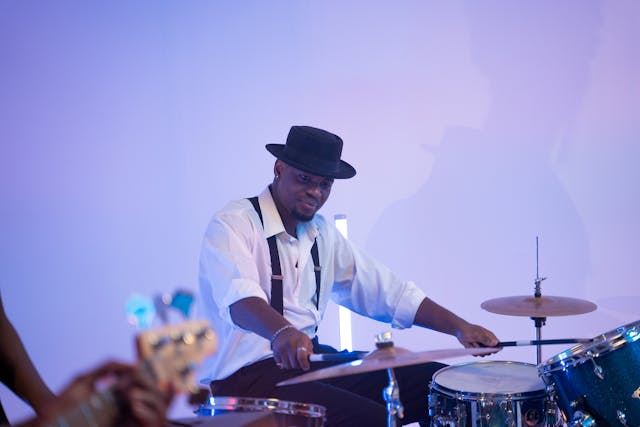Ghana’s powerful influence on the Afrobeat music revolution is undeniable. While Afrobeat is often associated with Nigeria’s Fela Kuti, Ghana’s rich musical heritage has been fundamental in shaping the genre’s unique sound.
Roots of Afrobeat: Ghana’s Musical Foundations
Afrobeat blends traditional African rhythms with jazz, funk, and highlife—the latter being a uniquely Ghanaian genre. Highlife’s lively guitar riffs, syncopated rhythms, and brass sections heavily influenced Afrobeat’s musical structure. According to Britannica, Afrobeat is “a fusion of West African musical styles,” with Ghanaian highlife playing a major role in this fusion.
Ghana’s music pioneers like E.T. Mensah helped popularize highlife in the 1950s and 1960s, providing a cultural blueprint that artists like Fela Kuti would later integrate into Afrobeat.

Ghanaian Artists Driving Afrobeat’s Evolution
Ghanaian musicians have continuously shaped Afrobeat’s sound. Legendary artists such as Ebo Taylor combined highlife with funk and jazz, influencing both Ghanaian and Nigerian Afrobeat styles. His work has inspired modern Afrobeat artists globally.

Today, Ghanaian stars like Sarkodie and Stonebwoy are instrumental in evolving Afrobeat by blending it with hip-hop, dancehall, and other modern genres. Even Nigerian-born Burna Boy, who has Ghanaian roots, credits Ghanaian influences in his music (Burna Boy on Ghana Influence – BBC).

Cultural and Social Commentary in Ghanaian Afrobeat
Afrobeat is more than music; it’s a platform for social and political expression. Ghanaian Afrobeat artists address societal issues such as inequality, corruption, and cultural identity through their lyrics. As noted by The Guardian, this honest storytelling resonates widely and adds depth to the genre.
Ghana’s vibrant culture—its festivals, languages, and history—infuses Afrobeat with authenticity that appeals globally.
Ghana’s Role in Afrobeat’s Global Rise
Thanks to streaming platforms like Spotify and Apple Music, Afrobeat has seen unprecedented global growth. Ghanaian music festivals, such as the Chale Wote Street Art Festival, promote Afrobeat culture and nurture new talent.
Moreover, international collaborations between Ghanaian artists and global stars help Afrobeat reach wider audiences. For instance, Sarkodie’s collaboration with artists like Beyoncé and Ed Sheeran exemplifies Ghana’s growing influence in global music (Billboard on Sarkodie Collaborations).
Conclusion
In conclusion, Ghana’s powerful influence on the Afrobeat music revolution is both historic and ongoing. From the roots of highlife to modern fusion artists, Ghana continues to drive Afrobeat’s vibrant evolution. As the genre spreads worldwide, Ghana remains a central force shaping its sound and message.




Leave a Reply